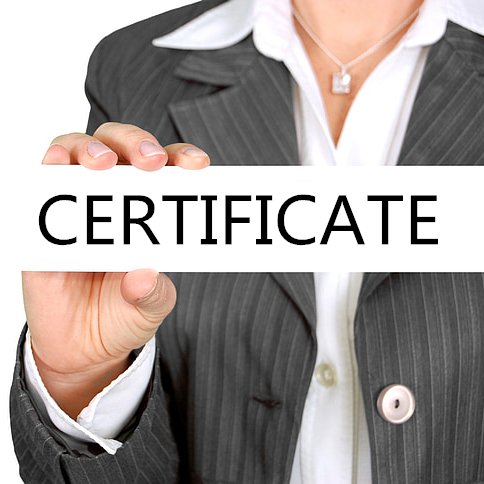Our water bottles include thermos water bottles, plastic water bottles, and Tritan water bottles. Available in many styles, including business, leisure, sports, and cute. Our water bottles can be used in many different scenarios with novel and unique design styles. Products are characterized as reusable, environmentally friendly, portable, and easy to clean. Because water bottle is a food contact product, in daily life will often use, and can help us replenish the body’s water needs at any time. So some countries for food contact products imported will be required to do the relevant testing and certification, in order to ensure the quality and safety of the product, which will not cause harm to humans or pollution of the environment.
We have maintained long-term cooperative relations with many factories. And the number of products is large, so we do not do product certification for each product, but do the product test according to customers’ needs. At present, some of our customers have proposed that they need to do LFGB testing and SABER certification for the products.
Our company all does our best to cooperate with the test and have obtained the qualified test report and certification so that customers can import and sell products smoothly.
Water cup products exported to the United States need the U.S. FDA certification, exports to Europe need the LFGB certification, exports to Japan need Japan Food Sanitation Law 370, exports to Saudi Arabia need SABER certification, while some European and American companies require Chinese companies have ROHS certification, BSCI certification, WCA certification, etc… Other countries are not necessarily required certificates.
Our products are of high quality and meet the testing requirements. We are ready to provide products for testing and certification if our customers have a need for them. If the customer has a designated testing organization, we can provide the products to the selected organization for testing and issue an official test report. If the customer does not have a designated organization, we will provide the product to the testing organization with our long-term cooperation for testing, and issue the official test report.
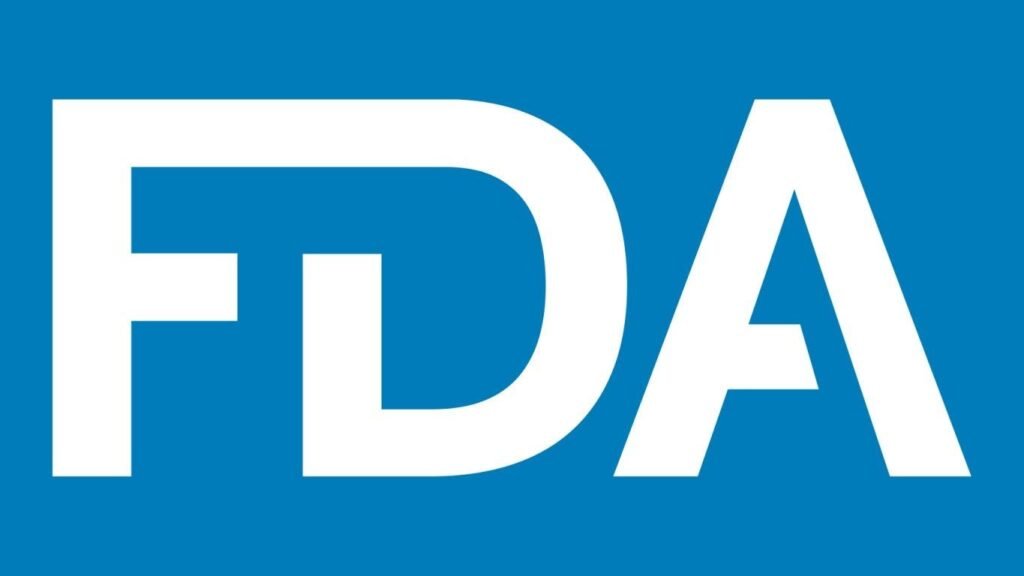
FDA mainly refers to the following two kinds.
FDA registration: many products sold in the United States need to be registered (such as food, drugs, medical devices, laser products, etc.), and some products must also be tested to apply for registration. The certificate on the market is basically issued by the third-party testing agency independent assistance to entrepreneurs after registration.
FDA testing: FDA testing is in accordance with FDA regulations for product testing.
U.S. FDA food-grade report is no expiration date, re-apply for the report on the premise that in the case of product material changes, or regulatory updates need to resubmit the product for testing.
FDA food registration is valid for two years, if not renewed on a regular annual basis, the product will be detained by customs during customs clearance.
How do identify if the FDA food registration is real and valid?
Check your registration information in FDA: it will show the registration number, registered enterprise, and address, if you can check, then it proves that your enterprise has completed the registration and the products can be freely exported to the United States.
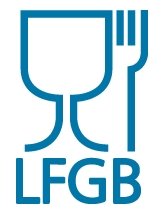
LFGB Certification:
The LFGB is the most important basic legal document for food hygiene management in Germany and is the guideline and core of other special food hygiene laws and regulations. All food and all food-related products on the German market must comply with its basic regulations.
LFGB tests all materials, including products manufactured with the latest processes, such as chrome plating for grills, temperature resistance tests for Teflon coatings on cooking pans, silicone seal tests in kettles, etc. The usual areas covered include ceramics, synthetic plastics, PVC, plasticizers, paper products, leather, textiles, cosmetics, tobacco, etc. Products involved include toaster ovens, sandwich ovens, electric kettles, and other electrical products in contact with food; food storage products; kitchenware such as reinforced glass chopping boards and stainless steel pots and pans; tableware such as bowls, knives and forks, spoons, cups and plates; clothing, bedding, towels, wigs, false eyelashes, hats, diapers, and other hygiene products.
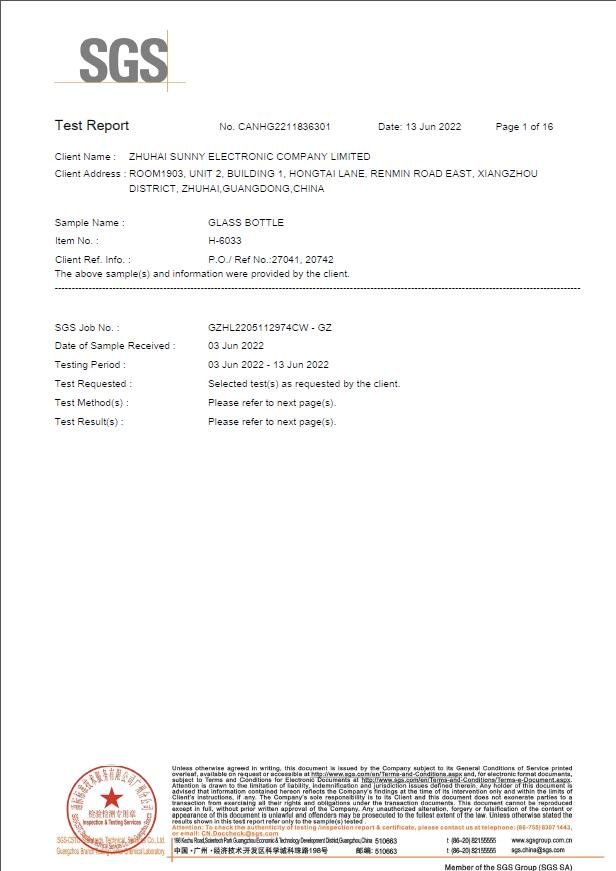
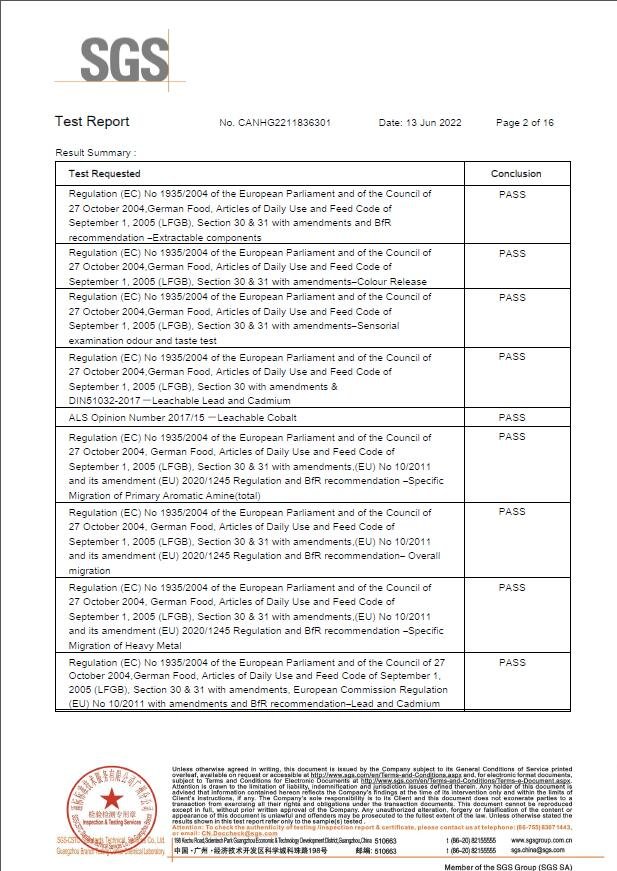
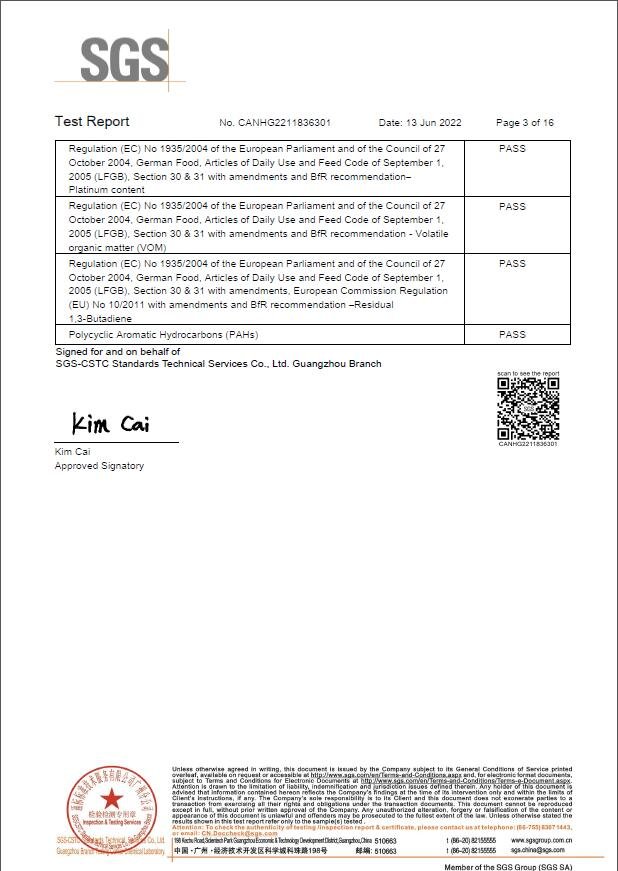
In general, the LFGB German Food and Daily Products Act, Articles XXX and XXXI include the following tests.
1. Initial inspection of samples and materials
2. Sensory evaluation of odor and taste transfer
3. Plastic samples: transferable components and precipitable heavy metals
4. Metals: testing of components and precipitable heavy metals
5. Silica resin: transferable or volatile organic compounds
6. Special materials: chemical hazard testing according to the German Chemical Act
The validity period of the LFGB test report: It is valid for a long time if there is no change in product design and regulatory directive requirements, except for the special requirements of buyers.

Japan Food Sanitation Law JFSL 370:
Japanese food contact material testing regulations by the Japanese Ministry of Health and Welfare control, Japan Food Sanitation Law JFSL 370, referred to as JFSL 370, all food contact to the material need to do the test mandatory. JFSL 370 test must be sent to the Japanese local test, test reports need to be filed in the Japanese Inspection and Quarantine Bureau, but also need to have a local agent in Japan. The JFSL 370 test must be sent to the Japanese local test report that needs to be filed in the Japanese Inspection and Quarantine Bureau, and also needs to have a local agent in Japan, so that the major Japanese ports can be checked in order to release the product.
Japanese food contact materials are generally common materials.
JFSL370 on food-grade materials control range mainly rubber, metal, glass, ceramic, enamel, plastic, paper, organic coating, wood, etc… Japan JFSL370 different test materials have different test items.
Common products.
Tableware: bowls, cups, knives and forks, spoons, pots, plates, dishes, chopsticks, trays, napkins, straws, etc.
Kitchenware: knives, pots, pans, spatulas, basins, peelers, grills/forks, etc.
Kitchen appliances: juicers, soy milk makers, coffee makers, kettles, ovens, microwave ovens, rice cookers, sterilizers, dishwashers, mixers, toasters, hoods, gas stoves, induction cookers, etc.
Food packaging materials: cling film, cling bags, cling boxes, storage jars, spice bottles, sealing jars, tablecloths, paper, etc.
In general, the following test items are included.
1. Polystyrene polystyrene, etc. (PS, ABS, GPPS, HIPS, AS, BS)
Total lead, total cadmium, heavy metal leaching (in terms of lead), potassium permanganate consumption, evaporation residue in distilled water, evaporation residue in 4% acetic acid, evaporation residue in 20% ethanol, evaporation residue in n-heptane, volatile matter test
2. PP Polypropylene resin Polymethyl Pentene (PMP) Polymethyl Pentene resin Polyvinyl Alcohol (PVA) Polyvinyl Alcohol 14 Polylactic acid (PLA)
Total lead, total cadmium, heavy metal dissolution (by lead), potassium permanganate consumption, evaporation residue in distilled water, evaporation residue in 4% acetic acid, evaporation residue in 20% ethanol, evaporation residue in n-heptane
3. Metal cans [except those containing dried foods (except fats and oils and fatty foods)]
Arsenic leaching, cadmium leaching, lead leaching, formaldehyde leaching, phenol leaching, epichlorohydrin leaching, vinyl chloride monomer leaching
Evaporation residue in distilled water, evaporation residue in 4% acetic acid, evaporation residue in 20% ethanol, evaporation residue in n-heptane, Metal (Tin for plating) metal (tin plating), lead-lead.
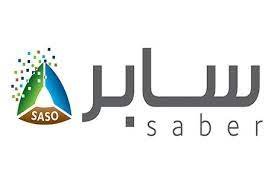
Saber certification is a new online application clearance certificate system launched by SASO Saudi Standards Authority, Saber is actually a web-based tool for product registration, issuance, and obtaining compliance COC certificate for fast customs clearance for Saudi importers, Saudi Saber clearance system and Saudi Fasah customs system has interoperable data
COC certificate is equal to PC certificate plus SC certificate, or COC certificate is equal to a self-declaration certificate plus SC certificate.
SABER certification is divided into four models:
1. SCOC mode (Supplier Conformity Declaration)
SCOC mode is directly registered and applies for the SCOC certificate, that is, “Shipment Conformity certificate for imported products”, with it, your products are allowed to enter the Saudi market.
Certification process: provide Saudi Saber system account password — commercial invoice — product pictures to the certification body.
2. COC Certificate or QM Certificate
If it is COC Certificate or QM Certificate, you need to apply for the following certificates
PC Certificate: Certificate of conformity for regulated products
SC Certificate: Shipment Conformity certificate for imported products
Certification process: open the importer Saber account — PC product registration test report — product photo information submitted — issuance of PC certification — shipping — application for SC customs clearance certificate
3. IECEE Certificate OR IECEE Certificate
Need to apply for CB certificate and report, before transferring to IECEE certificate
PC Certificate: Use the IECEE Certificate transfer to the Certificate of conformity for regulated products
SC Certificate: Shipment Conformity certificate for imported products
Certification process: Application for CB certificate and report — transfer to IECEE certificate — open the importer Saber account — PC product registration — product photo information submitted — issuance of PC certification — shipping — application for SC clearance certificate
4. GCTS Certificate OR IECEE Certificate (GCC/GMARK/GCTS Certificate or QM Certificate, transfer to COC Certificate)
Compulsory GCC/GMARK/GCTS Certificate: Apply for product test report (safety and EMC), then transfer to GCC/GMARK/GCTS Certificate
PC Certificate: Use the Certificate GCC/GMARK/GCTS transfer to the Certificate of conformity for regulated products
SC Certificate: Shipment Conformity certificate for imported products
GCC/GMARK/GCTS Certificate: Here GCC/GMARK/GCTS Certificate OR QM Certificate is out at the same time, so your query HS CODE corresponding to the product QM certificate is voluntary, can be done or not, we choose the cheap one — GCC/GMARK/ GCTS to do.
Certification process: product testing (Safety and EMC) — application for GCC/GMARK/GCTS certificate — open importer Saber account — PC product registration — product photo information submitted — issuance of PC certification — shipping — application for SC clearance certificate
5. QM Certificate (QM certificate, transfer to COC certificate)
Compulsory QM Certificate: apply for the product test report, then submit to SASO, apply for factory inspection, and issue QM Certificate
PC Certificate: Use QM Certificate transfer to Certificate of conformity for regulated products
SC Certificate: Shipment Conformity certificate for imported products
-Certification process: product testing (Safety and EMC) — application for SASO factory inspection by the Saudi Bureau of Standards — issuance of QM certificate — open importer Saber account — PC product registration — product photo information submitted — issuance of PC certification — shipping — application for SC clearance certificate
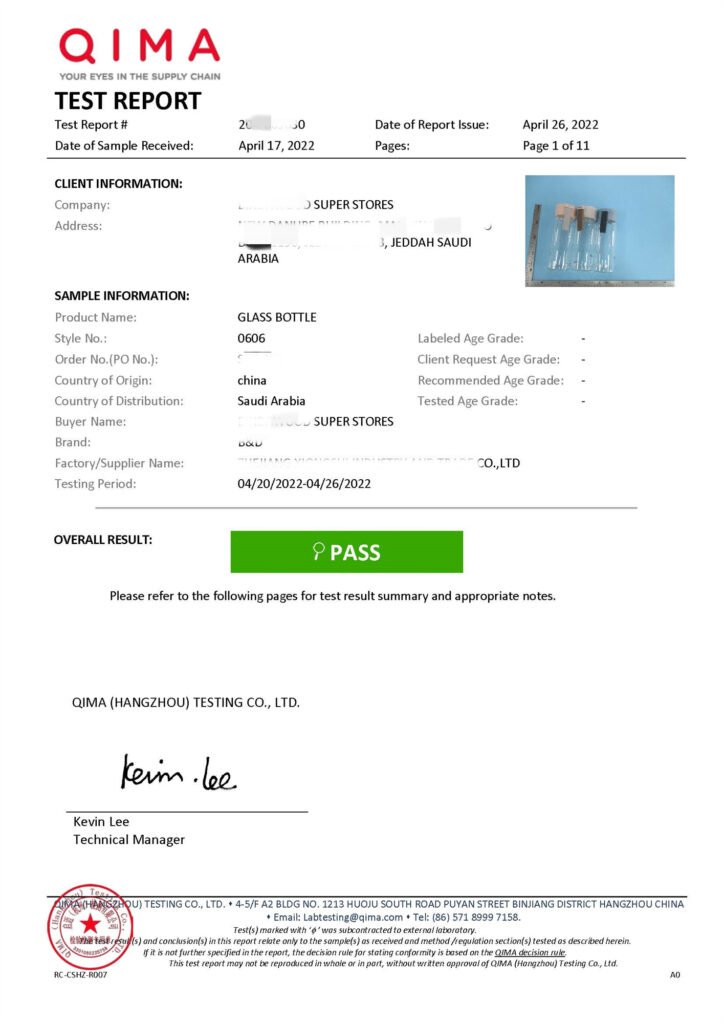
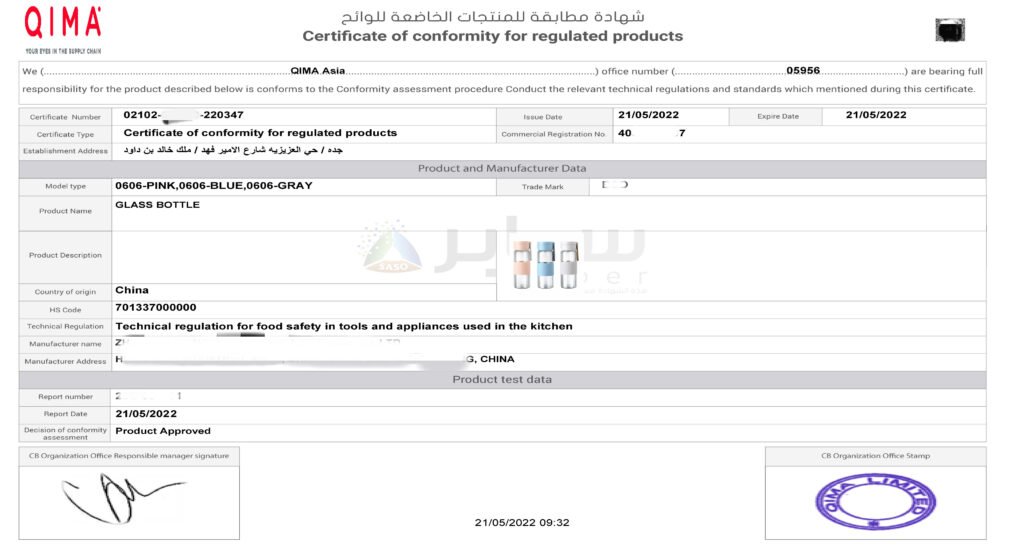
About SABER factory inspection and goods inspection requirements
1. Only need to submit information and do the register of SCOC, no need for factory inspection and goods inspection.
2. PCOC certificate + SCOC certificate, these products belong to low-risk products that do not need factory inspection and inspection but need to provide samples for product testing.
3. Strictly controlled products, such as building materials, ceramics, food contact, amusement equipment, infant products, etc. need to do factory inspection.
4. QM range of products need to do factory inspection, SASO sent professional staff to inspect the factory.

